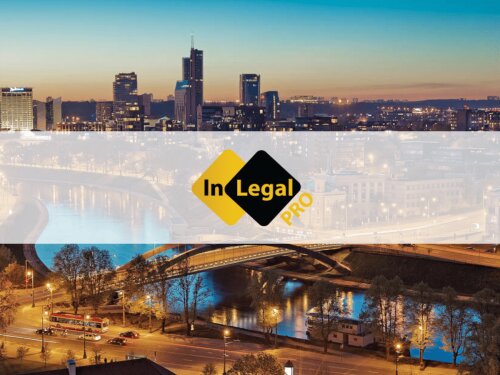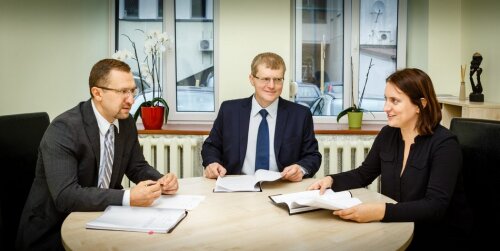Best Dependent Visa Lawyers in Republic of Lithuania
Share your needs with us, get contacted by law firms.
Free. Takes 2 min.
Or refine your search by selecting a city:
List of the best lawyers in Republic of Lithuania
About Dependent Visa Law in Republic of Lithuania
Dependent visas in the Republic of Lithuania are granted to family members of individuals who have been issued a residence permit in the country. Family members include spouses, children under the age of 18, and dependent parents. The purpose of a dependent visa is to allow family members to join their loved ones who are residing in Lithuania.
Why You May Need a Lawyer
Seeking legal advice from a lawyer specializing in Dependent Visa law in Lithuania can be beneficial in situations where there are complex legal requirements to be met, or if there are challenges in the visa application process. A lawyer can provide guidance on the necessary documentation, help with the application process, and represent you in any legal proceedings if needed.
Local Laws Overview
Key aspects of the local laws in Lithuania relevant to Dependent Visas include the requirement for the sponsor (the individual with a residence permit) to prove their ability to support their family members financially. Family members applying for a dependent visa must also meet certain eligibility criteria and provide supporting documents.
Frequently Asked Questions
1. How long does it take to process a dependent visa application in Lithuania?
The processing time for a dependent visa application in Lithuania can vary, but it typically takes several weeks to a few months.
2. Can I work in Lithuania on a dependent visa?
Dependent visa holders are not allowed to work in Lithuania unless they obtain a separate work permit.
3. Can I apply for permanent residency in Lithuania as a dependent visa holder?
Yes, dependent visa holders can apply for permanent residency in Lithuania after meeting certain residency requirements.
4. What are the financial requirements for a sponsor of a dependent visa in Lithuania?
The sponsor must demonstrate sufficient financial means to support their family members in Lithuania.
5. Can I appeal a decision on my dependent visa application?
Yes, you can appeal a decision on your dependent visa application within a specified timeframe.
6. What happens if my sponsor's residence permit in Lithuania is revoked?
If the sponsor's residence permit is revoked, the dependent visa may also be invalidated.
7. Can I travel freely within the Schengen Area on a dependent visa?
Dependent visa holders can travel within the Schengen Area for up to 90 days within a 180-day period.
8. What documents do I need to submit for a dependent visa application?
You will need to provide a valid passport, proof of relationship with the sponsor, proof of financial support, and other supporting documents.
9. Can I include other family members on my dependent visa application?
Only immediate family members, such as spouses and children, can be included on a dependent visa application.
10. Do I need to pass a language test for a dependent visa in Lithuania?
Language proficiency may be required for certain types of residence permits in Lithuania, but it is not typically a requirement for dependent visas.
Additional Resources
For more information on Dependent Visas in Lithuania, you can visit the website of the Migration Department of the Republic of Lithuania or consult with a legal professional specializing in immigration law.
Next Steps
If you require legal assistance or have any questions regarding Dependent Visas in Lithuania, it is recommended to seek advice from a qualified immigration lawyer who can guide you through the process and ensure that your rights are protected.
Lawzana helps you find the best lawyers and law firms in Republic of Lithuania through a curated and pre-screened list of qualified legal professionals. Our platform offers rankings and detailed profiles of attorneys and law firms, allowing you to compare based on practice areas, including Dependent Visa, experience, and client feedback.
Each profile includes a description of the firm's areas of practice, client reviews, team members and partners, year of establishment, spoken languages, office locations, contact information, social media presence, and any published articles or resources. Most firms on our platform speak English and are experienced in both local and international legal matters.
Get a quote from top-rated law firms in Republic of Lithuania — quickly, securely, and without unnecessary hassle.
Disclaimer:
The information provided on this page is for general informational purposes only and does not constitute legal advice. While we strive to ensure the accuracy and relevance of the content, legal information may change over time, and interpretations of the law can vary. You should always consult with a qualified legal professional for advice specific to your situation.
We disclaim all liability for actions taken or not taken based on the content of this page. If you believe any information is incorrect or outdated, please contact us, and we will review and update it where appropriate.
Browse dependent visa law firms by city in Republic of Lithuania
Refine your search by selecting a city.












